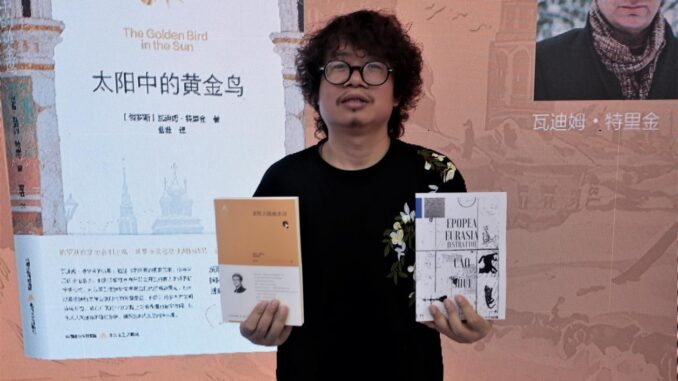
At the heart of the 31st Beijing International Book Fair, an event of exceptional cultural character extended, the debut of The Golden Bird in the Sun, a translated collection of poems by Russian poet Vadim Terekhin, rendered into Chinese by the renowned poet and translator Cao Shui. Held at the Shanxi Exhibition Area of the National Convention Center, this literary celebration coincided with the “Belt and Road” Two-Way Copyright Exchange Meeting, symbolizing a dynamic flow of ideas and expressions across continents. Guided by the Shanxi Publishing and Media Group and hosted by Beiyue Literature and Art Publishing House, the event brought together prominent figures in publishing and poetry, including BRICS Writers Association Coordinator Cao Shui, celebrated poet Wang Tong, and poet-editor Zhang Jianjun, further enriching the moment with an intercultural poetic dialogue that spanned languages, histories, and worldviews.
The Golden Bird in the Sun draws upon 200 of Terekhin’s short poems, each reflecting a philosophical gaze into the ordinary. Rooted in the lyrical traditions of Russian giants like Pushkin, yet imbued with modern metaphysical leanings, Terekhin’s poetry harmonizes East and West, seeking eternal meanings amidst the ephemeral. Cao Shui’s translation breathes new life into these verses, not just linguistically but emotionally, bridging Russian introspection with Chinese sensibilities. The poetic synergy celebrates a mutual longing for truth, beauty, and justice. On screen, Terekhin expressed deep gratitude to Cao and Beiyue Publishing, declaring the project a heartfelt gift to China-Russia friendship. His poetic tribute to Sanxingdui’s “Sun God Bird” sculpture, which inspired the title poem, exemplifies poetry’s role as a carrier of civilizational memory and connection.
More than a book launch, the event became a forum on the future of world literature. In a passionate speech, Cao Shui emphasized the need for Chinese poets to look beyond Eurocentric canons of the past century and to engage with contemporary voices from across the globe. He highlighted his ongoing translation endeavours, bringing works by poets from Turkey, Italy, UAE, Latin America, and beyond to Chinese audiences. These efforts not only enrich Chinese literary horizons but also help embed Chinese voices within the evolving narrative of global literature. At the same event, Italian poet Lamberto Garzia and Egyptian poet Ashraf Aboul Yazid celebrated the translation of Cao’s own epic poetry into their languages, affirming poetry’s power to leap across borders and resonate across worldviews.
The celebration of intercultural dialogue extended into film and performance. A poetry film based on Vadim’s “Autumn Colours” was screened, echoing the vision of the Beijing International Poetry Film Festival, which seeks to marry verse with cinematic expression. The highlight came when Wang Tong was honoured with Russia’s prestigious “108 Minutes” Space Poetry Award. His acceptance, delivered with emotive sincerity, likened the poetic journey to Yuri Gagarin’s legendary space flight, both acts of spiritual exploration and human aspiration. His trilogy of space-themed poems, frequently referencing Gagarin, exemplifies how poetry today can embody both the intimacy of human longing and the grandeur of cosmic vision.
The multilayered event concluded with a ceremony authorizing the translation of international poetic works into Chinese, including The Footsteps of Istanbul, The Song of the Knights, and The Epic of Humanity, which features contributions from 86 global poets. This marks a significant moment in world poetry: a collaborative anthology where Chinese poet Cao Shui writes the final lines, responding to UAE poet Adel Khozam’s opening, a global call-and-response in verse. As Beiyue Publishing continues to lead copyright exchanges along the Belt and Road, these poetic exchanges become more than cultural gestures, they are living, breathing evidences to the possibility of a shared human story, told in many tongues but felt as one.

Leave a Reply